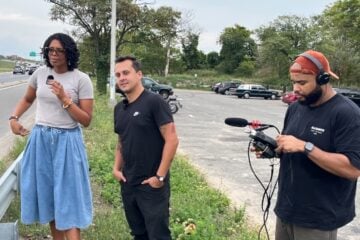Peace Corps alumni, drug safety groups press NPR to release Daniel Zwerdling’s investigative report

Bongoman/Wikimedia
The anti-malaria drug mefloquine, also called by its brand name Lariam.
Peace Corps alumni and drug safety organizations are calling on NPR to immediately air an investigation by Daniel Zwerdling, a veteran reporter who left the network last month after facing sexual harassment allegations.
The two-part report on the anti-malarial drug mefloquine had been scheduled to air in late November, according to an NPR email to stations and sources who assisted Zwerdling in his research. Zwerdling was absent from NPR or on leave in November, according to Current’s sources at NPR. His departure became official Feb. 6 when Current revealed that he had been investigated for sexual harassment.

NPR
Zwerdling
A key source on the investigation said Zwerdling suspended communications with him as of Nov. 21 and never explained the extended delays. Representatives of the organizations that pressed for publication say no one from NPR reached out to them to explain Zwerdling’s departure or the story’s cancellation, which they learned about through Current’s reporting.
“We don’t discuss our editorial process pre-publication, so don’t have anything to add,” NPR spokeswoman Isabel Lara said by email. Zwerdling did not respond to a request for comment.
The Vermont-based The Quinism Foundation, alongside three Peace Corps alumni organizations — Health Justice for Peace Corps Volunteers, the National Peace Corps Association and Returned Peace Corps Volunteers of Washington, D.C. — coordinated release of letters sent Wednesday to Christopher Turpin, NPR acting senior VP for news and editorial director. They urged him to air the investigative report because of its public service value and cited the time and resources they invested in supporting Zwerdling’s research.
“The potential influence of this story to save the life of just one Volunteer and raise awareness related to the health, safety and security of all Volunteers largely outweighs the unfortunate set of circumstances that surround this story,” wrote Nancy Tongue, founder and director of Health Justice for Peace Corps Volunteers, in her letter to Turpin. “HJPCV unequivocally would like to have this story air unadulterated in its current form as soon as possible.”

ClintonBPhotography
Nevin
Dr. Remington Nevin, executive director of The Quinism Foundation, began corresponding with Zwerdling about this story in April 2012. He helped Zwerdling connect with HJPCV in 2015. Both organizations provided research and introductions to former Peace Corps volunteers suffering from mefloquine’s devastating effects, which can include paranoia, severe anxiety and hallucinations. The drug, which Peace Corps has administered to volunteers in malaria-prone countries, is linked to a disorder that can lead to lasting psychiatric and neurologic symptoms and contribute to permanent disability.
Sara Thompson, legislative affairs specialist with HJPCV, began introducing Zwerdling to volunteers in June 2015. Thompson is a former volunteer who sued Peace Corps in 2014 after she began suffering from vestibular issues related to anti-malaria medication she took while serving in Burkina Faso between 2010 and 2012. Thompson estimates she exchanged at least 50 emails with Zwerdling, investing “a good week’s worth of work” in his reporting. She also met with him in person to answer questions.
Nevin said that Zwerdling has been covering the story in earnest since 2015, when their emails picked up in frequency. Nevin said he went to NPR’s studios at least twice for interviews. He estimates they’ve exchanged hundreds of emails, and he’s shared countless documents.
“I’m in contact with him virtually every week on this for the better part of two years,” Nevin said. “This certainly represented two or three years of solid effort on his part. This struck me as his largest investigative effort.”
Nevin knows the impact of a Zwerdling investigation. He was a source on Zwerdling’s 2010 NPR investigation with ProPublica that found the military had failed to diagnose and adequately treat soldiers who suffered mild traumatic brain injuries while serving in Iraq and Afghanistan. After the report was published, the Senate Armed Forces Committee immediately called a hearing on the issue. The commander of Fort Bliss in El Paso, Texas, which was cited in the report for not treating soldiers appropriately, told members of Congress that the U.S. Army base would review the care it provided to those with traumatic brain injuries.
At the time, Nevin was an outspoken epidemiologist in the Army. “It was days after the story aired that the military published a directive-type memorandum that essentially fixed all the problems that his story identified,” Nevin said. “It was remarkable how swiftly action came.”
Nevin said his group, a nonprofit supporting education and research on mefloquine poisoning, has deferred more aggressive advocacy with expectations that broadcast of Zwerdling’s report would fast-track a resolution. “We’ve lost three to five years of potential effort as a result,” Nevin said. “Turned down work with other networks out of respect for the exclusivity that NPR Investigations had been requesting; prioritizing our time for them. We’ve been set back in our efforts as a result.”

A screen capture of Zwerdling’s outreach in 2015 to a California Peace Corps alumni group on Facebook.
Despite their close working relationships with Zwerdling, Nevin and Thompson both said they don’t know how Zwerdling focused his investigation or the angle he took in reporting it. Thompson anticipates hearing compelling stories from other affected volunteers who spoke with Zwerdling on the record.
In its letter to Turpin, the Returned Peace Corps Volunteers of Washington said the report had survey feedback from more than 2,000 individuals and interviews with several members. Nevin said the investigative package included special web-based features and interviews with key national figures. It was likely critical of senior officials, Nevin and Thompson said.
“Obviously, this story is timeless in a way, in the sense that folks that are affected by this drug are not getting better; they are still disabled as a result of it, but there is some urgency in having these efforts air,” Nevin said. “I don’t mean to be melodramatic, but we lose people to suicide all the time because of this.”
Former NPR Ombudsman Alicia Shepard said NPR has an obligation to sources who devoted a lot of time and, in some cases, took personal risks in talking to Zwerdling.
How to protect big investigations
Though the circumstances of Zwerdling’s departure were unusual, NPR’s policy on bylines leaves some flexibility for crediting reporters who are involved in producing coverage for broadcast and digital publication. The policy specifies that the person who wrote the story gets the byline and that his or her name should come first.
In personal services contracts between individual correspondents and NPR, and in its policy handbook, NPR makes it very clear that a reporter’s work product belongs to the news organization, said Pat O’Donnell, executive director of the mid-Atlantic chapter of SAG-AFTRA.
“Now, when a reporter or someone leaves, they can negotiate with NPR,” O’Donnell said, citing examples such as a previously broadcast story that the reporter wants to use as a work sample in seeking another job or pursuing further research. “They can ask their managers or HR for permission to download something and take it with them, but they have to get permission.”
Several top editors said there aren’t clear-cut practices for finishing investigations that reporters don’t complete. Investigative journalists typically don’t want to see a big project die in their absence, they said. They’ll want to negotiate with their former employer for the professional courtesy of completing it.
“This feels a little like identifying best practices for being hit by lightning,” said Bill Keller, editor of the Marshall Project and former executive editor of The New York Times, in an email. “In my experience, reporters who have invested serious effort in an investigative piece will stick around to finish it.”
There are two practices that can help ensure that the story doesn’t go away if the reporter does, Keller said. “One is to keep clear, detailed records of the work done and the holes to be filled. Tapes, legible notes, neat data, etc. The other is to involve an editor along the way, an editor who knows the story in detail and, in most cases, an editor who knows the sources.”
“When you’re doing an investigation, a lot of this stuff resides in the reporter’s head in terms of what they know and what’s missing,” Shepard said. “The only other person besides Danny who might know a lot about it might be the editor. He should be reaching out to sources and filling them in.”
Andy Donahue, managing editor of Reveal at The Center for Investigative Reporting, said it’s an unenviable position to be in. He hasn’t had to navigate an immediate separation with a reporter. Nor is it a topic he’s heard addressed at conferences or among editors.
“We’d probably end up having to weigh how important of a story this is to us,” Donahue said. “Is it one of those stories where it’s going to hurt, we lost nine months of work, but maybe we just have to bag it and move on? Or is it such a vital story in the public interest that there’s no way you can give up on it? Then, I guess you have to figure out the logistical steps.”
It may come down to an IT question, such as figuring out what can be accessed on a reporter’s computer, Donahue said. Complexities of relationship-building also have to be considered. “How much work did that reporter have to do to win the confidence of people, and how sensitive are those sources?” Donahue asked. A new reporter may never be able to talk with some sources because of trust that was built during earlier research. Advocates, on the other hand, are used to dealing with lots of reporters in bringing their issue to public attention.
“As an investigative journalist, your sources really are where you derive your value,” said David Herzog, professor at the Missouri School of Journalism and academic advisor for National Institute for Computer-Assisted Reporting.
If Herzog were the editor, he would want the sources to know the story has been held. “But then again, it could be difficult or impossible to tell people exactly why, because sometimes stories get killed for legal reasons. Or, it looks like with this one, they’re sometimes held for personnel reasons.”
Reporters should share weekly memos with an editor to outline progress and next steps, and even include sources’ contact information, Herzog said. Similarly, interview notes should be transcribed immediately and shared with the team.
“Having lived through one of these, … it’s an incredibly difficult moment,” said Brant Houston, former executive director of Investigative Reporters and Editors who now teaches journalism at the University of Illinois at Urbana-Champaign. He once spent nine months off and on circling back to two of his former colleagues on an unfinished investigation. During a lesser project, a disgruntled departing reporter told Houston he wouldn’t help him at all. Houston had to re-report their work. “Of course, I was really frustrated because I had no role in why that person had left,” Houston said. “I felt that I was taking the brunt of their anger.”
As a reporter preparing to depart an organization, Houston said he’s spent his last two weeks briefing colleagues who took on his work, and communicating that he was available after he left. That’s a more standard approach, he said. However, he would not speak for someone who felt they had been mistreated or were fired. “That just throws this into a totally different realm,” Houston said.
Given the time and resources devoted to Zwerdling’s piece, NPR clearly considers it an important story, and it doesn’t stop becoming an important story after he leaves, Shepard said. “In an ideal situation, I or any reader should be able to read a story and be able to re-report it because you’ve linked to documents, you’ve told me who you talked to, unless you used anonymous sources,” Shepard said. “I can’t imagine, though, what NPR reporter would want to re-report his story.”
NPR and Zwerdling characterized his departure as a retirement after an award-winning career as an investigative correspondent. However, Morgan Lewis, a law firm that conducted an outside investigation of how NPR management handled claims of sexual harassment, acknowledged that complaints about Zwerding’s inappropriate conduct preceded his Feb. 6 departure.
‘We’re committed to the story’
Representatives from the Peace Corps alumni organizations and The Quinism Foundation said Zwerdling initially alerted them that the report was being prepared for publication last fall. But the dates continued to be pushed back, according to email exchanges with Zwerdling that Nevin and Thompson provided. Initially, Zwerdling assured them that a story wouldn’t be published until NPR sent out press releases about it.
Meanwhile, sexual harassment complaints swept two top editors out of NPR’s newsroom. Senior News VP Mike Oreskes and Chief News Editor David Sweeney lost their jobs in November as executive leadership tried to address complaints about sexual harassment in the newsroom. After leadership invited staff to report incidents of harassment, at least two staff filed complaints about Zwerdling, according to sources close to the investigation.
Zwerdling continued to correspond with Nevin through early November, Nevin said. The reporter was planning a follow-up story on mefloquine use among veterans. “I had no indication there was anything amiss, as he appeared to have support for this effort,” Nevin said.

In August 2015, NPR used Facebook to promote a confidential survey of Peace Corps volunteers.
On Nov. 21, Zwerdling wrote Nevin: “I am told that Legal has a couple questions, and because it’s Thanksgiving week, they dont want to/ cant [sic] go forward with Sunday and Monday broadcasts. I told you one shouldnt [sic] hold one’s breath…”
The first part of Zwerdling’s investigation was scheduled to air on Weekend All Things Considered Sunday, Nov. 26, Nevin said, while the second part would run on All Things Considered the next day. NPR informed stations Nov. 23 that it was cancelling the second installment, according to an email. It’s unclear what happened with the first segment.
Nevin said the plan to air two parts of the investigation in two different magazines was described to him as an “unparalleled collaboration.”
“I’m told by NPR that that’s like getting the Koreas to talk to each other,” Nevin said. “The shows are very much siloed despite their common title.”
When neither story aired in November, Thompson followed up with Zwerdling on Dec. 10, according to emails she provided. Zwerdling said he would keep her posted, but she did not hear from him again, she said.
After a long silence, Nevin asked Zwerdling Jan. 16 whether he was still at NPR. “We haven’t heard from you in a while and everyone is wondering about the story,” Nevin wrote.
Zwerdling responded Jan. 20 and apologized for being out of touch. “I can call and brief you sometime next week,” Zwerdling wrote. Nevin said he never heard from Zwerdling. He learned of his departure from Current’s coverage of allegations that Zwerdling had harassed female NPR newsroom employees and interns.
Through a mutual friend, Nevin subsequently connected with NPR Investigations editor Robert Little. Nevin asked Little Feb. 24 if NPR intended to air Zwerdling’s reports and if so, when, according to emails Nevin shared with Current. He didn’t receive a response, so Nevin followed up March 2.
In his reply to Nevin, Little apologized for not having “a detailed answer but we’ve been discussing this question here for some time and don’t have one yet.”
“We’re committed to the story, and are very proud of the work Danny did,” Little wrote. “But the path forward is complicated by production realities and other considerations that we haven’t worked through yet.”
Nevin spoke with Little by phone March 9 and came away with the impression that NPR could not air the report because Zwerdling is no longer an employee and not able to respond to any concerns about its broadcast. But he also learned that they were considering repackaging the investigation under another reporter.
Recalling his exchange with Little, Nevin said he urged him to make an exception for an investigative report of such importance.
Meanwhile, Nevin and Thompson said members of the Peace Corps community are harmed by continued delays in airing a report that would bring public attention to their suffering.
“There have been a few Peace Corps volunteers and military veterans who had been affected by this story that I have had to talk down from their paranoia,” Nevin said. “One of the troubling lasting side effects of this drug is that it can induce a lasting paranoia. People can see a conspiracy when there likely isn’t any.”







What a big can of worms this story has opened. Worms are nothing to be taken lightly. I am still left paranoid about contracting them overseas, and still wondering something along the lines of whether ‘the cure is worse than the disease?’
This smells of CYA to me; cover your a–. I reported the beating of children in schools, in Jamaica in 2010. My conclusion was; some things are embedded into the culture. Sad. Glad ppl are still speaking up, standing up for their own truth! Anyone reading this; ne ver stop speaking out when you see the outrageous happening wherever you are.
My comment does not minimize the serious, devastating even, impact of sexual harassment experienced by a man or woman. That aside, the idea should be entertained that 9My comment does not minimize the serious, devastating even, impact of sexual harassment experienced by a man or woman. That aside, the idea should be entertained that this story and all that went into it as well as all that may be necessary to complete and air it, could be morally greater and cover a more widely devastating issue. To pull a vital plug, in this case, Zwerdling, is to do grave disservice to the individuals who spoke up. Furthermore the Peace Corp and military veterans (possibly others…missionaries, those conducting regular business overseas…) remain in danger until this story is properly told.
So forbid Zwerdling to have contact with his accusers and build a structure of transparency and accountability around him. But for the sake of all that is holy, let the man finish what only he can capably complete.